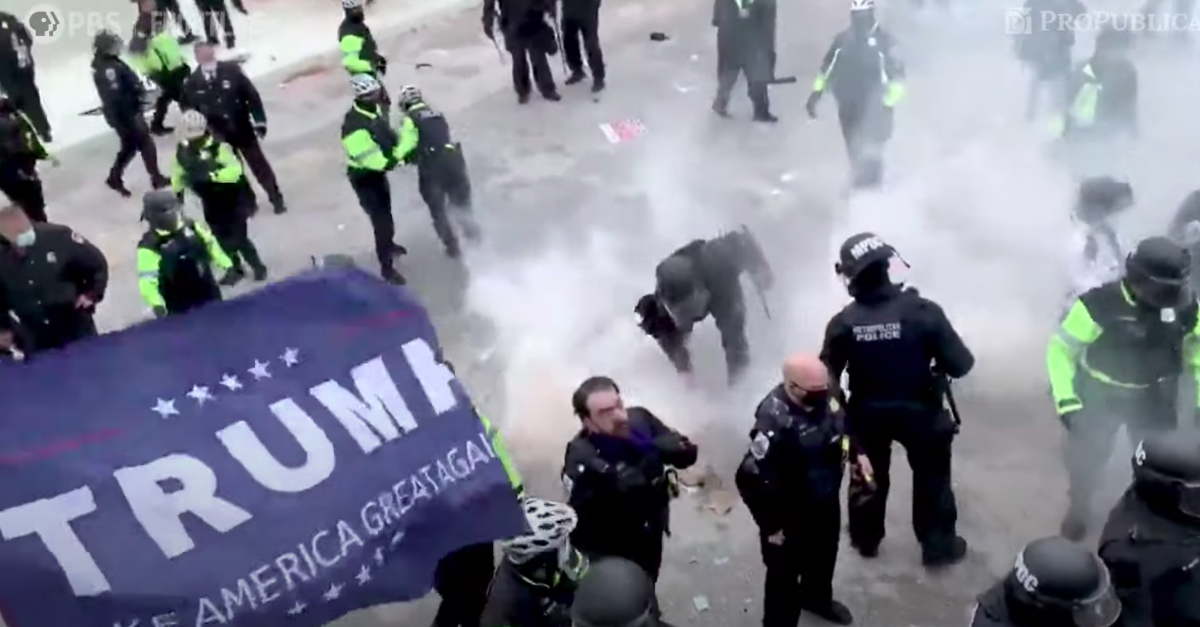
The Republican Party cannot scuttle the Jan. 6th Committee’s subpoena to its vendor investigating how election-fraud lies led to the attack on the U.S. Capitol, a federal judge ruled.
“This case presents an unusual thicket of procedural and substantive issues, in part because of the way the Select Committee decided to defend the case; in part because of the exceedingly rare spectacle of a congressional committee subpoenaing the records of one of our country’s two major political parties; and in part because those records reside with the RNC’s third-party vendor, rather than the RNC itself,” wrote U.S. District Judge Timothy Kelly, a Donald Trump appointee.
Ultimately, Judge Kelly emerged from that thicket by finding resoundingly in the favor of the Committee to Investigate the Jan. 6 Attack on the U.S. Capitol. The Republican National Committee’s lawsuit targeted the committee; its chair, Rep. Bennie Thompson (D-Miss.); vice chair, Rep. Liz Cheney (R-Wyo.); and eight other members from both parties. The judge found all of them, representing a co-equal branch of the federal government, constitutionally immune from the lawsuit that the Republican Party brought.
“As the Framers intended, House Defendants are immune from suit under the Speech or Debate Clause,” the judge wrote on Sunday.
“An Understandable Point”
Kelly did, however, agree to issue an administrative injunction giving the RNC the opportunity to appeal his opinion.
The Speech or Debate Clause states flatly in its final line that “for any Speech or Debate in either House, they shall not be questioned in any other Place,” a constitutional guarantee protecting members of Congress from arrest or civil liability, with limited exceptions, for actions taken during their official duties.
A lawyer for the Republican Party, from its third-party vendor Salesforce, did not immediately respond to Law&Crime’s email requesting comment.
The RNC describes Salesforce.com as its “key data and digital communications vendor” and alleges that forcing it to comply with a subpoena would provide the committee with an “all-access pass to confidential RNC political strategies and the personal information of millions of its supporters.”
Judge Kelly rejected the Republican Party’s overbreadth argument.
“Still, the RNC argues that the subpoena is overbroad because the Select Committee undisputedly seeks information ‘wholly unrelated’ to the January 6 attack, such as ‘holiday greeting’ campaigns that took place between November 3, 2020 and January 6, 2021,” the ruling states. “However, the Speech or Debate Clause prohibits the Court from parsing the Select Committee’s demands so finely. The Court is unaware of any court that has ever done so when deciding whether the Clause applies.”
The judge also was not moved by the RNC’s claim that the subpoena represented an “open attempt by political foes to unearth a competing political party’s internal deliberations and political and digital strategy.”
“Given the obvious political dynamics involved, this is an understandable point,” the opinion states. “And to be sure, although the subpoena has been narrowed through negotiation, the Court recognizes the highly unusual nature of the Select Committee’s demand for what is mostly the RNC’s information and documents, even though they are in Salesforce’s possession. The problem for the RNC is that this Court may not examine House Defendants’ motives when evaluating whether the Clause applies. Courts ‘are not the place for such controversies.'”
“A ‘Uniquely Weighty’ and ‘Vital’ Study”
Outside the forum of the courthouse, Salesforce and the Jan. 6 Committee negotiated the scope of the subpoena, obviating the vendor’s concerns that it violated the Stored Communications Act.
For Kelly, that made the matter “moot.”
Quoting the U.S. Court of Appeals for the D.C. Circuit’s description of the Committee’s probe, the judge also found that the subpoena is part of a “uniquely weighty” and “vital” study.
“To repeat: according to the Select Committee, its investigation and public reporting suggest that claims that the 2020 presidential election was fraudulent or stolen motivated some who participated in the attack, and emails sent by the RNC and the Trump campaign using Salesforce’s platform spread those claims,” the ruling states. “Through the subpoena, the Select Committee seeks information that will help it understand whether and how much those email campaigns attracted attention and thus were a factor in the January 6 attack. […] And the Select Committee’s knowledge of the causes of the attack will make it ‘better able to fulfill its responsibility’ of providing well-informed recommendations to the House for remedial measures to avert a future attack. […] In sum, the materials demanded have particular ‘value’ to the Select Committee ‘in the exercise of legislative duty,’ and its interest in this information is strong.”
For Kelly, the record did not show that the Committee had been trying to disclose an adversary’s digital strategy.
“Nothing suggests that the Select Committee is demanding, or that Salesforce is preparing to produce, internal RNC memoranda laying out its digital strategy. The RNC’s representations on this front appear to assume that if all the material it feared was at stake were disclosed—including, for example, granular personal information about its donors, such as their giving history—the information “could” be used to create a ‘mosaic’ of its email-outreach strategy that its political rivals could then use to better compete with the RNC in the
digital arena,” the ruling states. “No doubt. But—again, to return to one example—the RNC’s donors’ personal information and giving histories are not being demanded or produced.”
The Committee’s lawyer referred Law&Crime’s press inquiry to the office of House Speaker Nancy Pelosi (D-Calif.), which didn’t immediately respond to an email requesting comment.
Read the ruling, below:
(Screenshot via ProPublica)